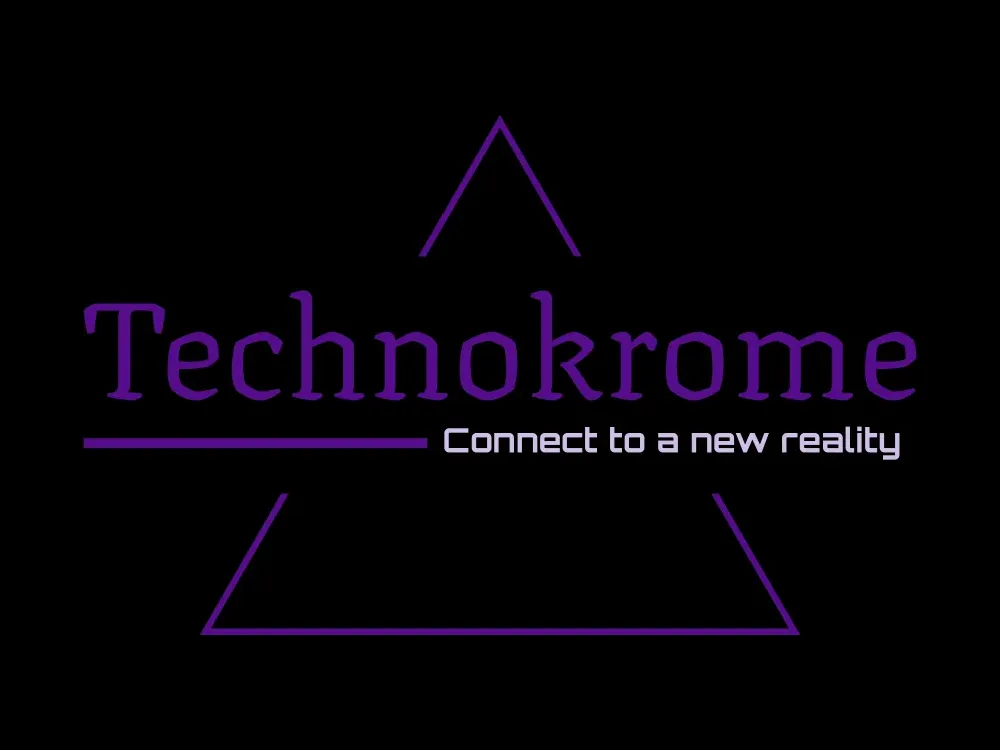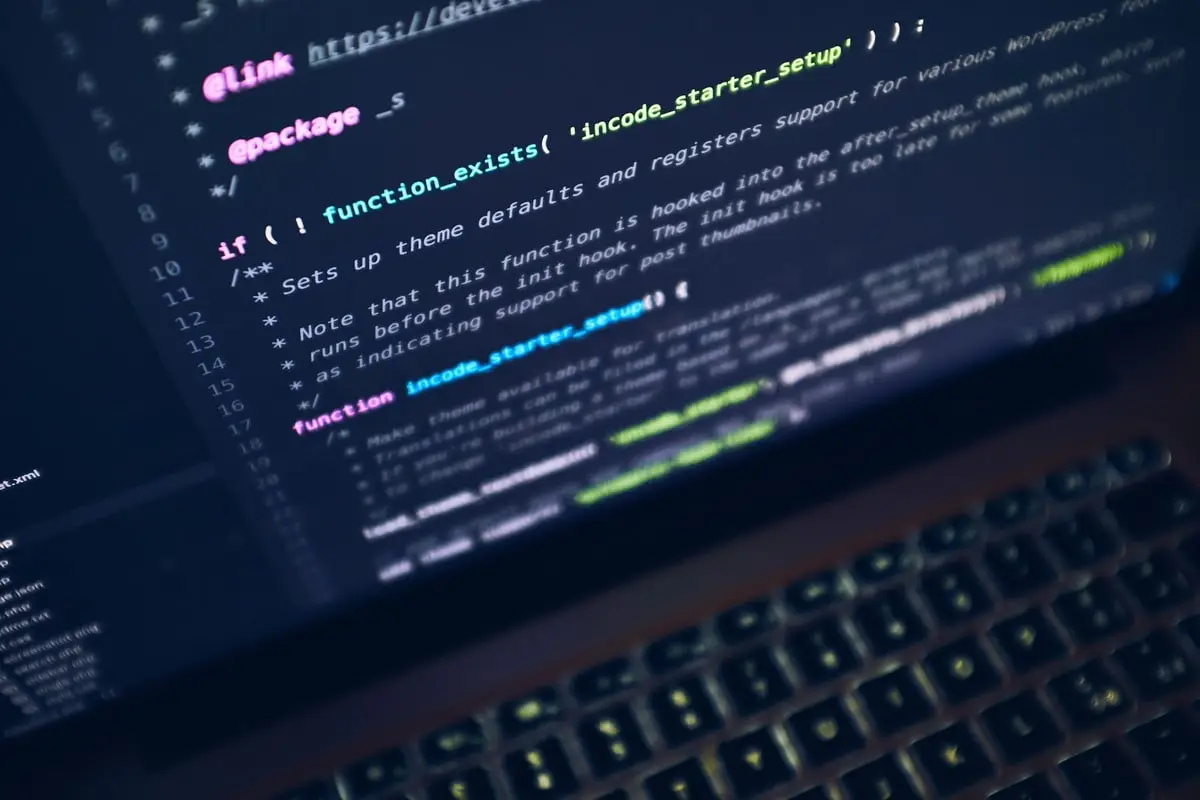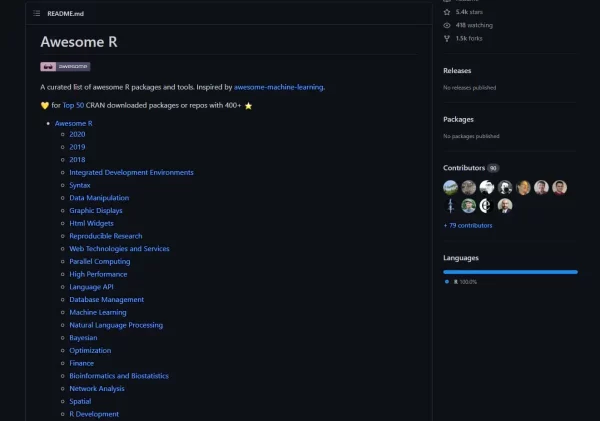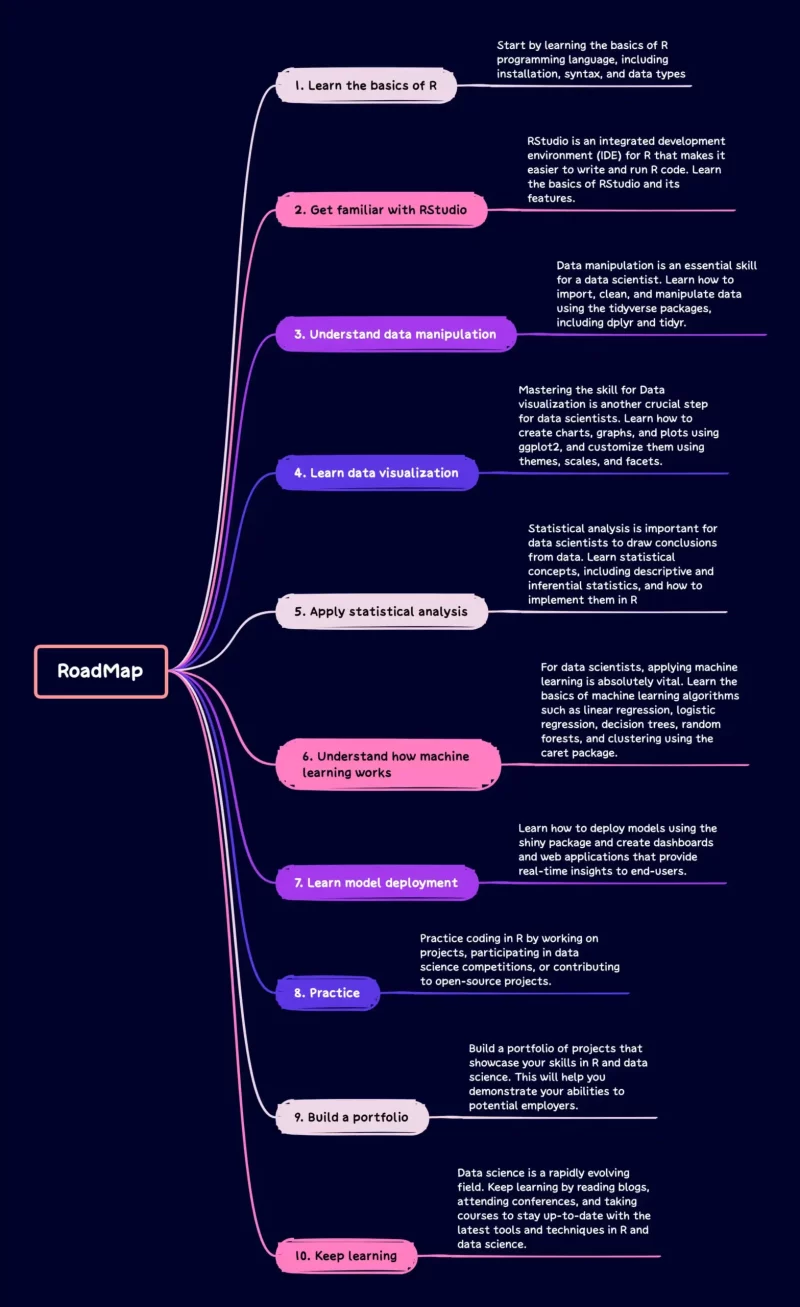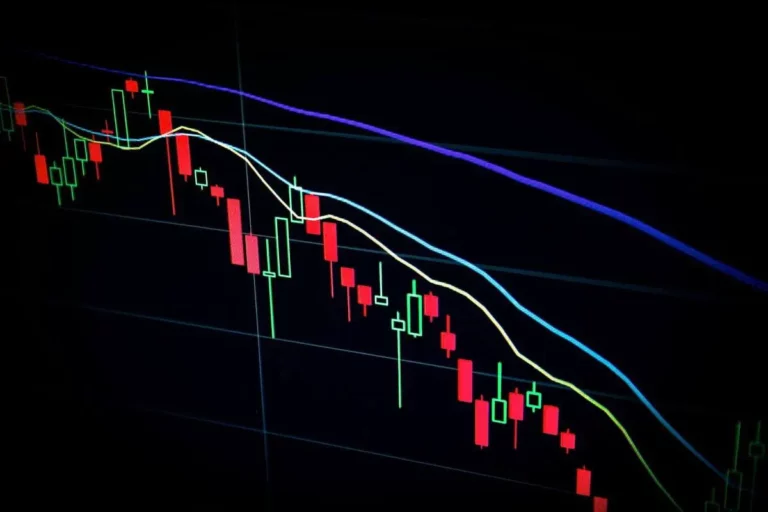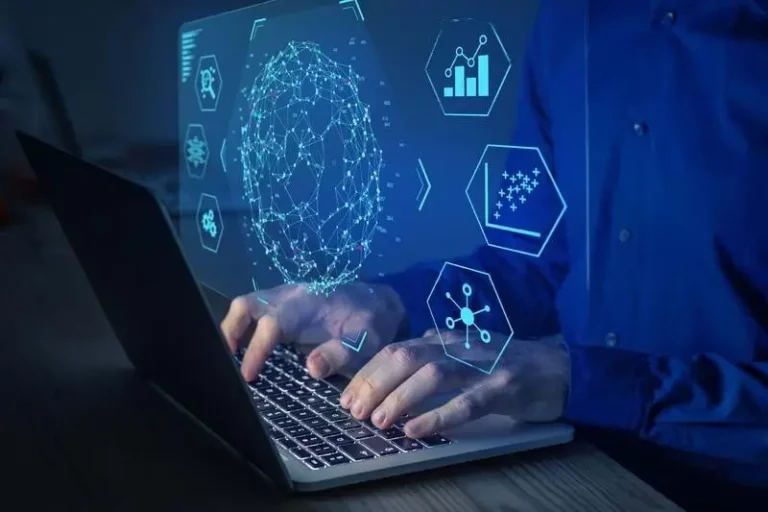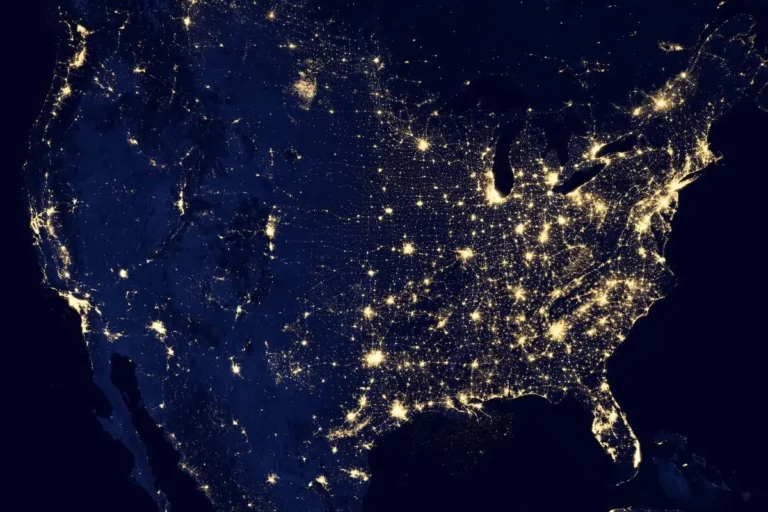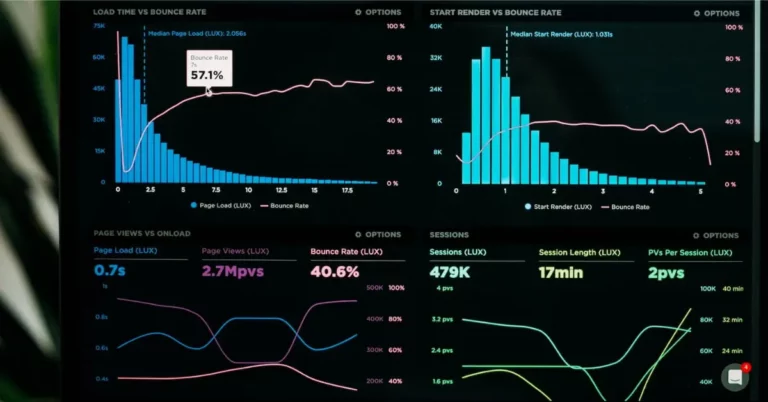Businesses and organisations are increasingly using data-driven insights to guide decision-making in this era of big data. As a result, there is an exponential increase in demand for qualified experts who can analyze, modify, and visualize data.
Statistics, computer science, and domain knowledge are all included in the multidisciplinary discipline of data science. The R programming language’s robust capabilities for data manipulation, statistical analysis, and machine learning have made it one of the most widely used tools for data science.
This article offers suggestions for both online and offline sources, as well as Github repositories with data packages, tests, and worksheets for practise. Best recommended books in the market are also included, and you can always use the links below the Roadmap to get into more details.
Table of Contents
Required Previous Knowledge
To become a data scientist with the R track, you should have a basic understanding of programming and statistics. Here are some essential skills and knowledge that can help you succeed in learning R for data science:
- Programming Basics : Programming terms like variables, loops, functions, and conditional statements should be familiar to you.
- Statistics: You ought to be familiar with fundamental statistical ideas including regression analysis, hypothesis testing, and mean, median, mode, and standard deviation.
- Mathematics: Understanding some of the more complex machine learning principles as well as having a strong foundation in calculus and linear algebra, may also benefit you.
- Data Analysis: You ought to be acquainted about the fundamentals of data analysis, including how to collect, clean, and transform data.
- Problem-solving Skills: Since tackling complicated problems is a key component of data science, having strong problem-solving abilities and the capacity for critical thought are essential.
Just keep in mind that you don’t have to be an expert in each of these to begin learning R for data science. Even so, having a solid foundation in these capacities can make it easier for you to understand the concepts and make your learning process more fruitful.
Moreover, if you need assistance in learning and developing these skills, there are a ton of resources online, which I have also discussed below.
Online Resources
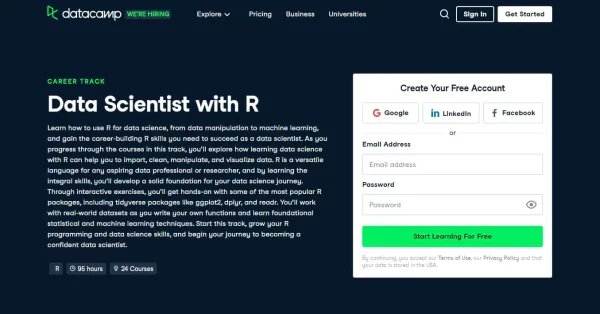
There are many online resources available for studying data science with the R track. Here are a few of the most popular and widely-used resources:
- DataCamp: An engaging online learning environment called DataCamp offers courses and learning modules on a range of data science subjects, such as R programming, data manipulation, visualisation, machine learning, and more. Both free and paid subscriptions are available.
- Coursera: Popular online learning site Coursera provides specialisations and courses from prestigious institutions all around the world. They provide a wide variety of certifications on a number of disciplines and data science courses that cover subjects like R programming, data analysis, machine learning, and more.
- edX: Another website for online learning that provides courses and programmes from selective universities and organisations is edX. Numerous data science programmes and courses are accessible there, covering things like R programming, data analysis, statistics, and more.
- RStudio: The integrated development environment (IDE) for R programming, RStudio, is free and open-source. It also provides a wealth of learning materials for R, such as articles, webinars, and tutorials.
- Kaggle: On the Kaggle platform, users can access datasets to hone their skills and compete in data science competitions. Additionally, they provide a diverse range of tutorials and courses as well as other learning materials for data science.
These are just a few of the countless online tools that may be used to learn data science using the R track. Finding the resources that suit your needs and learning preferences is crucial, whether those are interactive tutorials, videos, or conventional textbooks.
Offline Resources
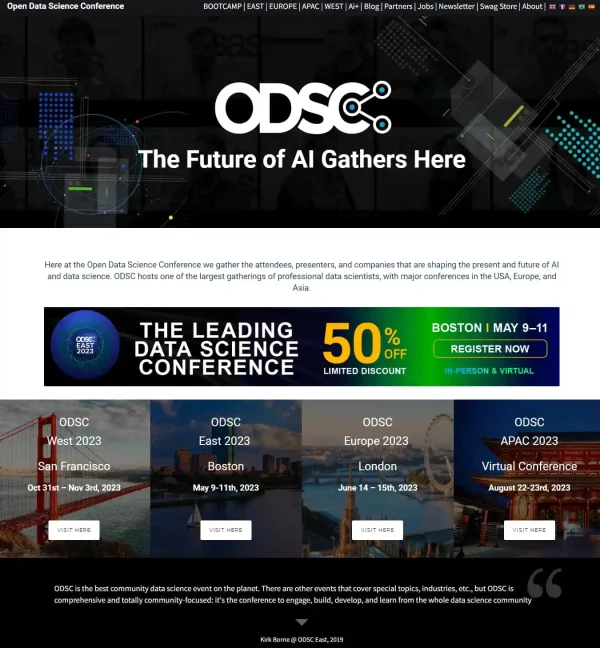
While online resources are abundant, there are also some valuable offline resources that can be used for studying data science with the R track. Here are a few recommendations:
- Books: Numerous books on data science and R programming are available; they cover a wide range of topics, from fundamental programming approaches to sophisticated statistical techniques. Popular books on the subject include “Applied Predictive Modeling” by Max Kuhn and Kjell Johnson, “Data Science from Scratch” by Joel Grus, and “R for Data Science” by Hadley Wickham and Garrett Grolemund.
- Meetup Groups: An excellent approach to meet other data science enthusiasts and gain knowledge from seasoned experts is through meetup groups. Various Meetup groups for data science and R programming provide frequent gatherings and activities for learning and networking.
- Conferences: Attending data science conferences can be a fantastic opportunity to network with other professionals and remain updated on the industry’s newest trends and practises. The yearly useR! conference and the Data Science Conference are two well-known conferences in this field.
- Workshops and Bootcamps: Several organizations provide live courses and bootcamps on data science subjects, including R programming. These can be excellent opportunities to gain practical knowledge and instruction from experienced educators.
These are just a few examples of the offline materials offered for those taking the R track in data science. Finding the tools and resources, whether online or offline, that suit you and your learning style is crucial.
Recommended Books
Here are some highly recommended books for studying to be a data scientist with the R track:
- “R for Data Science” – By Hadley Wickham and Garrett Grolemund: The data science pipeline, from data import and cleaning to visualization and modelling, is covered in this book, along with a detailed introduction to the R programming language.
Additionally covered is the well-known tidyverse group of tools for data manipulation and visualization. - “Hands-On Programming with R” – by Garrett Grolemund: This book is a wonderful resource for newbies learning R programming, as it covers both basic programming concepts and more advanced topics like functional programming and data visualization.
- “Applied Predictive Modeling” – by Max Kuhn and Kjell Johnson: This book covers the theory and practice of predictive modelling using R, with a focus on practical applications in industry.
It provides guidance on selecting and fine-tuning models and covers a range of modelling techniques, including tree-based models and linear regression. - “Data Science from Scratch” – by Joel Grus: This book is a superb resource for learning Python, R programming and data science principles. It covers a wide range of topics, including machine learning, natural language processing, data manipulation and vizualisation.
- “Data Mining with R” – by Luis Torgo: This book offers an introduction to data mining methods and the R programming language. It discusses a range of methodologies, including association rule mining and clustering, and provides real-world examples and case studies.
These books are all well acclaimed in the field of data science and among those in similar communities. I am sure beginners in this field will be provided a solid foundation for learning data science with the R track, using these resources.
Github Repos That Can Be Referenced
There are many Github repositories that are helpful for beginner data scientists on the R track. Here are a few examples:
Check It Out here: https://github.com/qinwf/awesome-R
What It Is: This is a curated list of R packages, tools, and resources for data science, machine learning, and statistical analysis. It includes links to packages for data manipulation, visualization, modeling, and more.
2. “tidyverse”
Check It Out here: https://github.com/tidyverse/tidyverse
What It Is: This is a collection of R packages for data manipulation and visualization that are commonly used in data science workflows. It includes packages like dplyr, ggplot2, and tidyr.
3. “DataCamp-Projects”
Check It Out here: https://github.com/DataCamp-Projects
What It Is: DataCamp is an online learning platform for data science, and they offer a variety of R courses and projects. Their Github repository includes project templates and solutions for some of their R courses.
4. “data-visualization-with-ggplot2”
Check It Out here: https://github.com/Z3tt/data-visualization-with-ggplot2
What It Is: This repository includes a series of worksheets and examples for learning data visualization with ggplot2, a popular package for creating graphics in R.
5. “data-science-projects”
Check It Out here: https://github.com/ritvikmath/data-science-projects
What It Is: This repository includes a collection of data science projects that can be completed using R. It includes projects on topics like exploratory data analysis, predictive modeling, and natural language processing.
These repositories are just a few examples of the many resources available on Github for beginner data scientists on the R track. They can be a great source of datasets, code examples, and project ideas for anyone learning data science with R.
